The electric vehicle market has seen a remarkable surge in innovation and competition, particularly in the SUV segment. Two of the most prominent models vying for supremacy are the VW ID.4 and the Tesla Model Y. Both vehicles boast cutting-edge technology, remarkable performance, and eco-friendly credentials. However, how do they compare? In this article, we'll delve into the technical specifications, performance metrics, and innovations of both models to see how they stack up against each other.
VW ID.4 vs Tesla Model Y - Differences and prices compared
Compare performance (340 HP vs 627 HP), boot space and price (34600 £ vs 34300 £ ) at a glance. Find out which car is the better choice for you – VW ID.4 or Tesla Model Y?
Electric Performance and Capabilities
When it comes to electric performance, both the VW ID.4 and Tesla Model Y offer compelling options. The VW ID.4 is available in both rear-wheel and all-wheel drive configurations, with power outputs ranging from 170 to 340 HP, depending on the variant. This gives the ID.4 an acceleration time of up to 5.4 seconds for the high-performance variant, while the standard variant offers a respectable 6.7 seconds. The ID.4's impressive torque of 679 Nm further enhances its acceleration and responsiveness.
On the other hand, the Tesla Model Y features an even broader range of power options with outputs up to 534 HP. Its top acceleration time of just 3.7 seconds for the Performance model places it firmly in the sports SUV category, making it one of the quickest in its segment. With a torque figure reaching up to 660 Nm, the Model Y promises a thrilling driving experience.
Battery Life and Range
Range anxiety is a common concern among electric vehicle owners, but both the VW ID.4 and Tesla Model Y deliver impressive ranges that should ease those worries. The ID.4 offers a maximum electric range of 572 km for higher variants, while the lower-end model still achieves a solid 357 km. Its battery capacity options include a 77 kWh and a 52 kWh version, making it versatile for different needs.
The Tesla Model Y, on the other hand, can reach an impressive maximum range of 600 km, depending on the battery variant selected. With battery capacities of 62 kWh and 79 kWh, it offers multiple options that cater to both performance and efficiency. The Model Y's lower consumption rates, with figures as low as 14.9 kWh/100km, also give it an edge in efficiency over the ID.4.
Interior Comfort and Cargo Space
Interior comfort is subjective, but both models provide spacious cabins for passengers. The VW ID.4 seats up to five and offers a trunk capacity of 543 liters, making it practical for families and long trips. The layout embraces simplicity and modern aesthetics, aligning well with contemporary design philosophies.
The Tesla Model Y slightly edges out in terms of cargo space, presenting an impressive 854 liters, which is ideal for those who prioritize utility and flexibility. Additionally, the option for a third row allows the Model Y to accommodate up to seven passengers, catering to larger families or groups.
Charging Options and Technology
Charging infrastructure is crucial for any electric vehicle, and both the ID.4 and Model Y benefit from a growing network of fast-charging stations. The ID.4 can charge at a rate of up to 125 kW, enabling it to recuperate significant range in under 30 minutes. Meanwhile, the Tesla Model Y takes advantage of the extensive Supercharger network, allowing rapid charging at rates up to 250 kW, ensuring quicker charge times and better long-distance travel capabilities.
In terms of technology and innovation, the Tesla Model Y is equipped with industry-leading software capabilities, including over-the-air updates, advanced driver-assistance features, and a minimalist interior dominated by a large touchscreen interface. The ID.4 offers a more traditional approach with a digital cockpit, yet still integrates key modern tech elements like a central infotainment display and various driver assistance systems.
Conclusion: Which One Should You Choose?
Choosing between the VW ID.4 and Tesla Model Y ultimately depends on individual needs and preferences. The ID.4 delivers a robust and spacious SUV experience, perfect for those who appreciate practicality and comfort. In contrast, the Model Y excels in performance, cutting-edge technology, and range efficiency, appealing to those who value speed and tech prowess.
Both vehicles embody the future of electric mobility, providing compelling options for anyone looking to transition to an eco-friendly driving experience. Whether you opt for the VW ID.4 or the Tesla Model Y, you're guaranteed a step towards sustainable driving without sacrificing performance or comfort.
Video - VW ID.4
Here’s where it gets real: The technical differences in detail
Costs and Efficiency:
Price and efficiency are key factors when choosing a car – and this is often where the real differences emerge.
Tesla Model Y has a minimal advantage in terms of price – it starts at 34300 £ , while the VW ID.4 costs 34600 £ . That’s a price difference of around 295 £.
In terms of energy consumption, the advantage goes to the Tesla Model Y: with 13.10 kWh per 100 km, it’s slightly more efficient than the VW ID.4 with 15.60 kWh. That’s a difference of about 2.50 kWh.
As for electric range, the Tesla Model Y performs hardly perceptible better – achieving up to 622 km, about 53 km more than the VW ID.4.
Engine and Performance:
Under the bonnet, it becomes clear which model is tuned for sportiness and which one takes the lead when you hit the accelerator.
When it comes to engine power, the Tesla Model Y has a clearly edge – offering 627 HP compared to 340 HP. That’s roughly 287 HP more horsepower.
In acceleration from 0 to 100 km/h, the Tesla Model Y is decisively quicker – completing the sprint in 3.50 s, while the VW ID.4 takes 5.40 s. That’s about 1.90 s faster.
In terms of top speed, the Tesla Model Y performs evident better – reaching 250 km/h, while the VW ID.4 tops out at 180 km/h. The difference is around 70 km/h.
There’s also a difference in torque: VW ID.4 pulls noticeable stronger with 679 Nm compared to 493 Nm. That’s about 186 Nm difference.
Space and Everyday Use:
Whether family car or daily driver – which one offers more room, flexibility and comfort?
Both vehicles offer seating for 5 people.
In curb weight, VW ID.4 is minimal lighter – 1975 kg compared to 1976 kg. The difference is around 1 kg.
In terms of boot space, the Tesla Model Y offers distinct more room – 822 L compared to 543 L. That’s a difference of about 279 L.
In maximum load capacity, the Tesla Model Y performs noticeable better – up to 2138 L, which is about 563 L more than the VW ID.4.
When it comes to payload, VW ID.4 somewhat takes the win – 551 kg compared to 472 kg. That’s a difference of about 79 kg.
Who wins the race in the data check?
The Tesla Model Y is far ahead overall in the objective data comparison.
This result only shows which model scores more points on paper – not which of the two cars feels right for you.
Costs and Consumption
View detailed analysis
Engine and Performance
View detailed analysis
Dimensions and Body
View detailed analysis
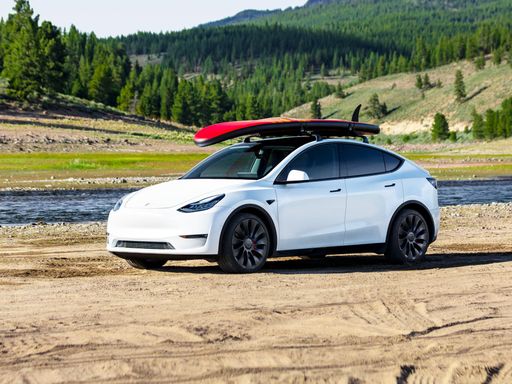
Tesla Model Y
VW ID.4
The VW ID.4 is a calm, roomy electric SUV that turns everyday driving into a quietly confident experience, its practical packaging and smooth manners tailored perfectly for family life. Volkswagen's solid build and intuitive interior tech mean you get electric practicality without the sci‑fi theatrics, making the ID.4 a sensible, surprisingly likable choice for most buyers.
details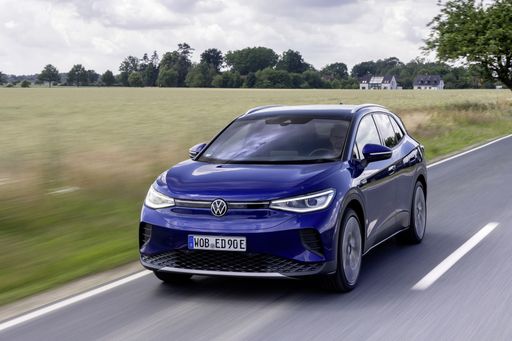
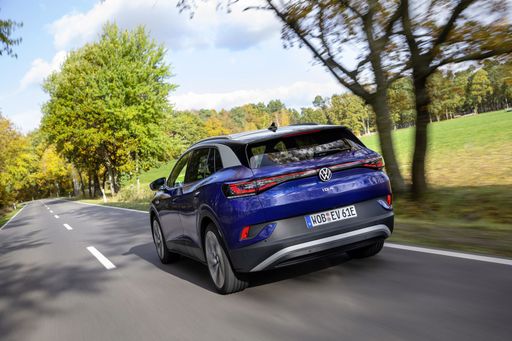
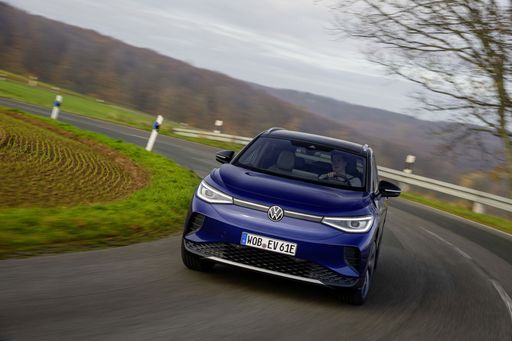
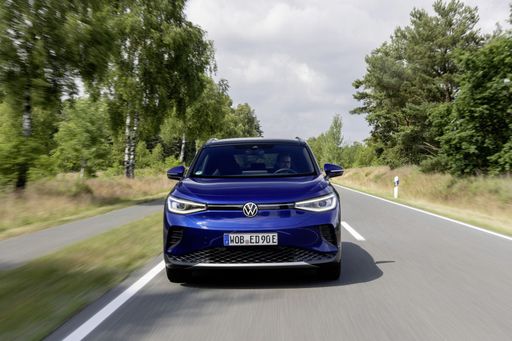
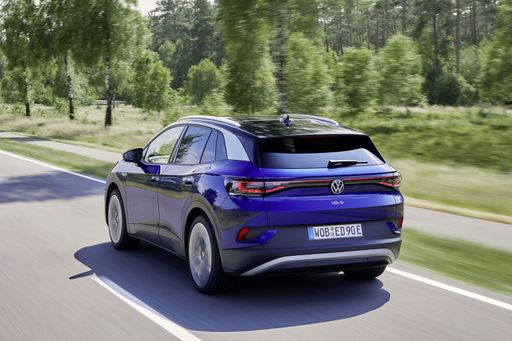

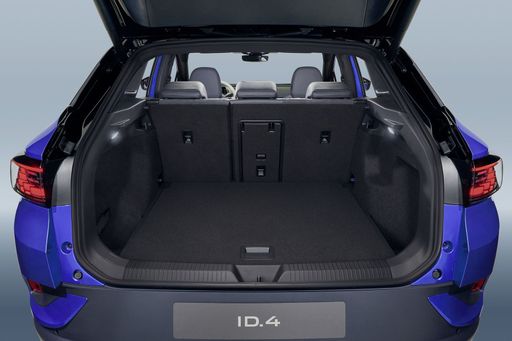
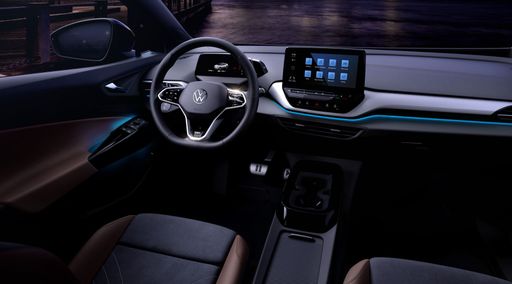
Tesla Model Y
The Tesla Model Y blends SUV practicality with sports-car poke, wrapping a roomy, minimalist cabin and handy hatch into a slick, aerodynamic package that feels more Silicon Valley gadget than garage ornament. It’s an ideal pick for buyers who want effortless electric driving, regular software improvements and access to Tesla’s convenient charging network, though style-conscious shoppers should know it’s more about tech and efficiency than classic luxury.
details
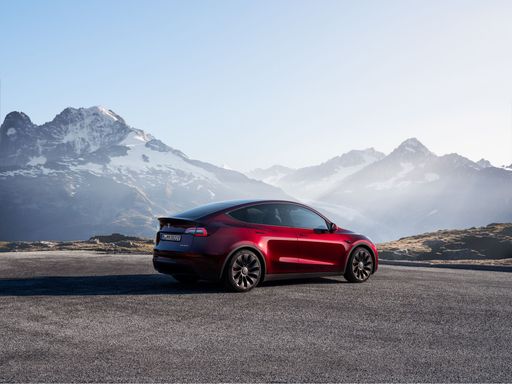
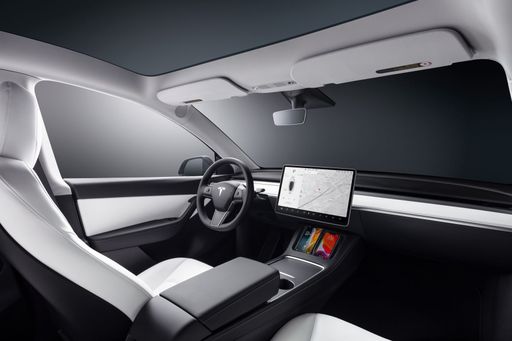
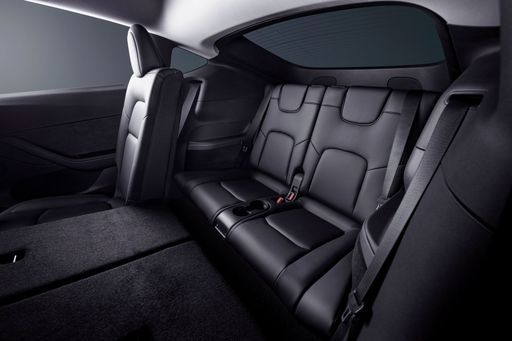
Costs and Consumption |
|
|---|---|
|
Price
34600 - 47200 £
|
Price
34300 - 53100 £
|
|
Consumption L/100km
-
|
Consumption L/100km
-
|
|
Consumption kWh/100km
15.6 - 17 kWh
|
Consumption kWh/100km
13.1 - 16.2 kWh
|
|
Electric Range
356 - 569 km
|
Electric Range
534 - 622 km
|
|
Battery Capacity
52 - 77 kWh
|
Battery Capacity
64.5 - 85 kWh
|
|
co2
0 g/km
|
co2
0 g/km
|
|
Fuel tank capacity
-
|
Fuel tank capacity
-
|
Dimensions and Body |
|
|---|---|
|
Body Type
SUV
|
Body Type
SUV
|
|
Seats
5
|
Seats
5
|
|
Doors
5
|
Doors
5
|
|
Curb weight
1975 - 2248 kg
|
Curb weight
1976 - 2108 kg
|
|
Trunk capacity
543 L
|
Trunk capacity
822 L
|
|
Length
4582 - 4584 mm
|
Length
4790 - 4797 mm
|
|
Width
1852 mm
|
Width
1921 mm
|
|
Height
1619 - 1634 mm
|
Height
1611 - 1624 mm
|
|
Max trunk capacity
1575 L
|
Max trunk capacity
2022 - 2138 L
|
|
Payload
515 - 551 kg
|
Payload
440 - 472 kg
|
Engine and Performance |
|
|---|---|
|
Engine Type
Electric
|
Engine Type
Electric
|
|
Transmission
Automatic
|
Transmission
Automatic
|
|
Transmission Detail
Reduction Gearbox
|
Transmission Detail
Reduction Gearbox
|
|
Drive Type
Rear-Wheel Drive, All-Wheel Drive
|
Drive Type
All-Wheel Drive, Rear-Wheel Drive
|
|
Power HP
170 - 340 HP
|
Power HP
299 - 627 HP
|
|
Acceleration 0-100km/h
5.4 - 9 s
|
Acceleration 0-100km/h
3.5 - 7.2 s
|
|
Max Speed
160 - 180 km/h
|
Max Speed
201 - 250 km/h
|
|
Torque
310 - 679 Nm
|
Torque
420 - 493 Nm
|
|
Number of Cylinders
-
|
Number of Cylinders
-
|
|
Power kW
125 - 250 kW
|
Power kW
220 - 461 kW
|
|
Engine capacity
-
|
Engine capacity
-
|
General |
|
|---|---|
|
Model Year
2023 - 2025
|
Model Year
2025
|
|
CO2 Efficiency Class
A
|
CO2 Efficiency Class
A
|
|
Brand
VW
|
Brand
Tesla
|
Is the VW ID.4 offered with different drivetrains?
Available configurations include Rear-Wheel Drive or All-Wheel Drive.
